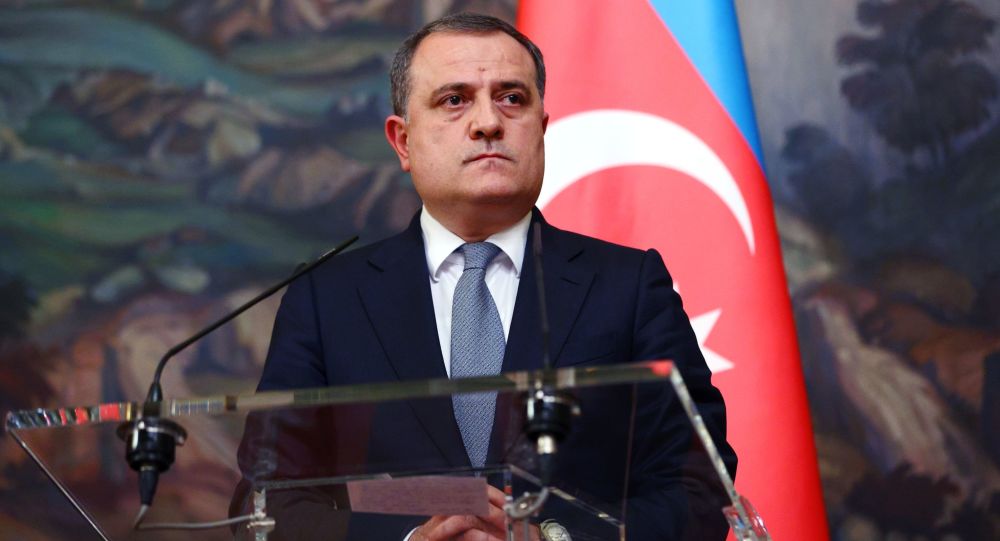Azerbaijani and Armenian foreign ministers held a direct telephone conversation amidst the work on the preparation of a future peace treaty between the two countries.
In the first communication of its kind in more than 30 years, Foreign Minister Jeyhun Bayramov reportedly discussed key issues pertaining to the normalization of bilateral relations with his Armenian counterpart Ararat Mirzoyan on Monday.
“As a follow up to the agreements reached at the level of the leaders of both states, the sides had an exchange of views about the work on the preparation of a future peace treaty, convening of a Joint Border Commission, as well as the humanitarian issues,” Azerbaijan’s foreign ministry said in a statement.
At the meeting hosted by European Council Charles Michel on April 6, Azerbaijani President Ilham Aliyev and Armenian Prime Minister Nikol Pashinyan agreed that their respective foreign ministers would work on the preparation of a future peace treaty that would address “all necessary issues.” The sides also agreed to convene a Joint Border Commission by the end of April to start border delimitation and demarcation process between Azerbaijan and Armenia, and ensure a stable security situation along, and in the vicinity of, the borderline.
The significant part of the state border of Azerbaijan with Armenia, measuring 1,007 kilometers in length, remained out of the country’s control for nearly 30 years after Azerbaijan's Karabakh (Garabagh) region fell under the illegal Armenian occupation in the early 1990s. Following the Soviet Union’s dissolution in 1991, Armenia launched a full-blown military campaign against Azerbaijan, marking the longest and deadliest war in the South Caucasus region. The bloody war ended with a ceasefire in 1994, which saw Armenia forcibly occupying 20 percent of Azerbaijan’s internationally recognized territories. Over 30,000 Azerbaijanis were killed and one million others were expelled from those lands in a brutal ethnic cleansing policy conducted by Armenia.
On September 27, 2020, the decades-old conflict between the two countries intensified after Armenian forces deployed in occupied Azerbaijani lands shelled military positions and civilian settlements of Azerbaijan. During counter-attack operations that lasted 44 days, Azerbaijani forces liberated over 300 settlements, including the cities of Jabrayil, Fuzuli, Zangilan, Gubadli, and Shusha, from a nearly 30-year-long illegal Armenian occupation. The war ended in a tripartite statement signed by Armenia, Azerbaijan, and Russia on November 10, 2020. Under the statement, Armenia also returned the occupied Aghdam, Kalbajar, and Lachin districts to Azerbaijan.
The restoration of Azerbaijan’s control over a large portion of its 1,007-kilometer border with Armenia as a result of the war unearthed new realities on the Armenia-Azerbaijan state border. Post-war border protection works of the Azerbaijani army have faced hostile backlash from the Armenian side since May 2021. Yerevan blames Azerbaijani forces for “encroaching” on Armenia’s sovereign territory. Since then, Armenia's military conducted numerous provocations against the Azerbaijani army, resulting in serious complications on the frontier. Baku has been calling for the delimitation and demarcation of the frontiers in order to settle the recurring issues on the borderline.
“In general, I think that many may not fully understand this circumstance, but in diplomatic practice, demarcation and delimitation is a technical process,” Tofig Zulfugarov, who served as Azerbaijan’s foreign minister from 1998 to 1999, was quoted as saying by 1news.az.
“It can come only as a consequence of reaching a peace treaty and mutual recognition of territorial integrity and sovereignty. And this is what Armenia does not want to do.”
Azerbaijani authorities included the border delimitation and demarcation issue in the basic principles for the establishment of mutual relations that were contained in a proposal package submitted to Yerevan in March. The document once again reiterated the importance of mutual recognition of territorial integrities and the inviolability of internationally-recognized borders.







 The number of evacuees from flooded areas in Kazakhstan has reached 97,852 people, including about 32,856 children since March 27.
The number of evacuees from flooded areas in Kazakhstan has reached 97,852 people, including about 32,856 children since March 27.
 The Islamic holy month of fasting, Ramadan comes to an end this week with the celebration of a joyous festival called Eid (meaning “festival” in Ar...
The Islamic holy month of fasting, Ramadan comes to an end this week with the celebration of a joyous festival called Eid (meaning “festival” in Ar...
 Iran's senior military leaders described the drone and missile attack on Israel on April 14 night as “successful".
Iran's senior military leaders described the drone and missile attack on Israel on April 14 night as “successful".
 Azerbaijan officially unveiled the logo for the upcoming 29th session of the Conference of the Parties to the United Nations Framework Convention o...
Azerbaijan officially unveiled the logo for the upcoming 29th session of the Conference of the Parties to the United Nations Framework Convention o...



